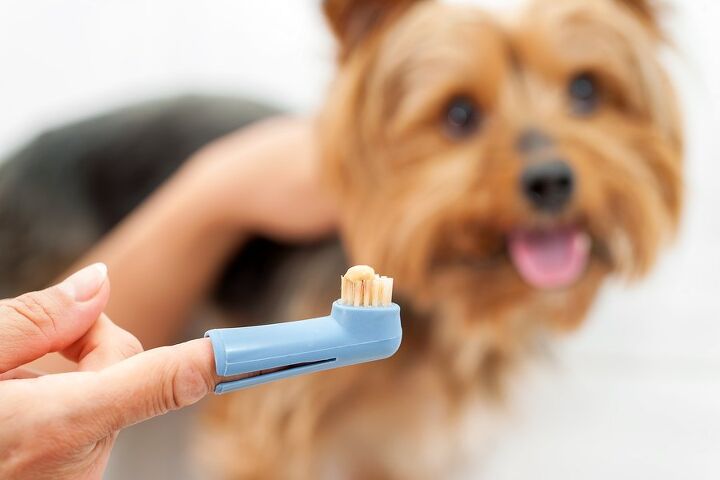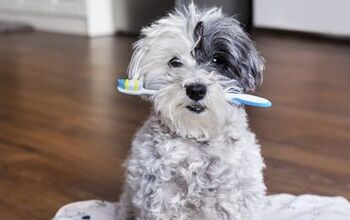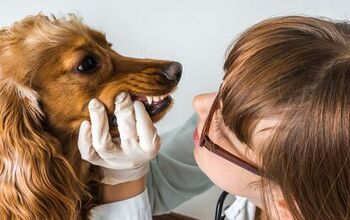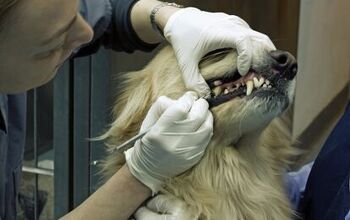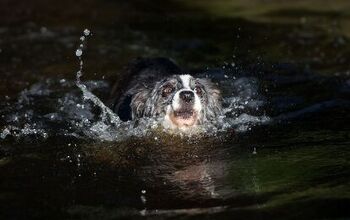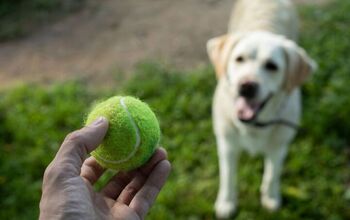Pros and Cons of Pet Dental Care Products

Periodontal disease, or gum disease, is incredibly common in dogs. In fact, an estimated 80 percent of dogs show signs of dental disease by the time they reach three years of age. As common as gum disease is in dogs, it is also extremely preventable. In this article you will learn about the top methods for maintaining your dog’s dental wellness.
There are a variety of different methods and products designed to help pet owners maintain their dog’s dental health. Below you will find a list of the most common options as well as some pros and cons for each one:
- Pros: Dog toothbrushes come in several different forms so you can choose the one that works best for your dog. Finger toothbrushes are easy to use and can help you complete the task quickly while regular dog toothbrushes may have a longer reach into your dog’s mouth. Dog toothpastes often come in a variety of tasty flavors to help make toothbrushing a time a positive experience, even for dogs that normally would have no interest. Many veterinarians will agree that this is the most effective way to keep your dog’s teeth clean and prevent dental problems between checkups.
- Cons: Some dogs simply will not tolerate having their teeth brushed so you may need to work up to it, slowly desensitizing your dog to the experience. If you have a dog that is experiencing early signs of periodontal disease, gingivitis, or other dental concerns that can make their teeth or gums sensitive, the use of a toothbrush may cause too much discomfort.
Related: What to Expect with a Veterinary Teeth Cleaning
- Pros: Unlike standard dog toothpastes, these products are designed to be used without a toothbrush, making it more desirable for dogs that dislike having their teeth brushed. They contain ingredients that prevent plaque, fight bacteria, and improve your dog’s breath all by simply rubbing the toothpaste onto your dog’s teeth.
- Cons: They still require you to reach inside of your dog’s mouth to spread the paste, meaning some dogs still won’t tolerate the use. While they are effective, and some are even approved by the Veterinary Oral Health Council, they often come at a higher price point than standard toothpastes.
- Pros: Dental sprays for dogs are not intended to be a replacement for regular brushing but they can help to reduce plaque buildup between brushings – these products may also help to fight bad breath. Most sprays can be applied directly to the dog’s teeth and gums up to twice per day.
- Cons: The downside of this option is that it may not work to get rid of existing plaque and tartar buildup. In fact, the breath freshening effect may help to hide the early warning signs that something is wrong, which often comes with a noticeable change in your pup’s breath.
- Pros: As an additional measure to brushing, certain water additives are supposed to help reduce plaque and tartar buildup in a dog’s mouth. This is an option that is much easier to introduce to dogs that aren’t willing to tolerate the use of a toothbrush, with many not even changing the flavor of your dog’s water. They could be drinking from a bowl of treated water and not even realize it!
- Cons: Unfortunately, many pet owners who use these products find that they are not particularly effective. They certainly should not be used as an alternative to brushing your dog’s teeth.
Related: Talking About Tartar Buildup On Dog’s Teeth
- Pros: Some of the most popular dental toys for dogs are rubber toys that help to rub plaque off of your dog’s teeth. These toys are made from durable rubber so they last a long time and many of them can be filled with tasty treats like peanut butter to entice your dog to use them. These toys are often covered with ridges and nubs, creating an uneven surface allowing them to get up and around your dog’s teeth, working away at the plaque build up while also massaging your dog’s gums. Some even include ingredients that help to freshen your dog’s breath at the same time.
- Cons: The downside of these toys is that some dogs will be able to chew them into smaller pieces which may pose a choking hazard. Most of these products are not meant to be edible, so if your dog accidentally swallows one it could create an intestinal obstruction.
- Pros: Real bones come in several forms and they are popular with dogs. Meaty bones are a good option for aggressive chewers and they are less expensive than dental toys. Rawhides are simply compressed fat and they are fully digestible for dogs, not to mention tasty.
- Cons: Rawhide can be high in calories and can pose a problem if your dog swallows it whole. Bones can be too hard for teeth, causing dental fractures, and they can splinter into sharp edges. This is especially true for dogs that may already have dental problems, meaning that their teeth are more fragile and more susceptible to damage.
- Pros: Some dental treats have been shown benefit a dog’s dental health and are fully digestible. Many of these small edible treats can be substituted for your dog’s regular training treats, making it easy to incorporate them into your dog’s daily routine without adding too many additional calories.
- Cons: The downside of these treats is that they can be high in calories and they may be expensive if you need to buy large ones for large dogs. In some cases they have also been shown to aggravate food allergies in dogs.
- Pros: Dental chews work similar to the bones as mentioned above, making them a good choice for more aggressive chewers. They are fully digestible and designed to be eaten, meaning that you don’t have to worry about your dog swallowing something that it shouldn’t.
- Cons: The cost of purchasing these chews can add up quickly. If your dog manages to get a larger piece off the chew and swallows it, it may still pose a choking risk despite being digestible. They shouldn’t be offered to your dog unless they are being supervised.
- Pros: These special dog food formulations are designed to help reduce tartar and plaque on your dog’s teeth both by scraping away at the plaque with their kibble design as well as including special ingredients that help to discourage the formation of plaque and tartar in the future. They are easy to incorporate into your dog’s routine as they are simply a substitute for your dog’s regular meal.
- Cons: Often, these specialty dog foods come with a much higher price tag, with many options only being available for purchase directly through your veterinarian. If your dog has any food allergies or intolerances, it may be difficult to find a dental diet that can accommodate their needs.
Taking care of your dog’s teeth is important and should be considered an important part of your dog’s overall health regime. By implementing any of these doggy dental options, along with regular vet checkups, you can stay on top of plaque and tartar that can cause major problems.

Kate Barrington is the loving owner of two cats (Bagel and Munchkin) and a noisy herd of guinea pigs. Having grown up with golden retrievers, Kate has a great deal of experience with dogs but labels herself a lover of all pets. Having received a Bachelor's degree in English, Kate has combined her love for pets and her passion for writing to create her own freelance writing business, specializing in the pet niche.
More by Kate Barrington



